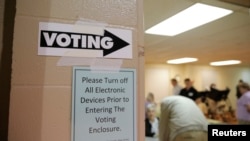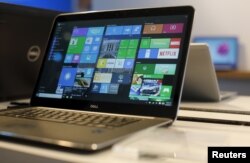UPDATE: March 29 This story incorrectly said the March 22nd Utah Republican caucus the first state-wide test of voting by Internet in the U.S. In fact, the 2000 Arizona Democratic primary allowed voter to vote online; the Utah caucus was the first use of blockchain technology in voting. You can read more about the 2000 Arizona online vote here.
This Tuesday, March 22, when Republicans in Utah caucus to nominate a candidate for U.S. President, many of them won’t actually be in Utah. In fact, some won’t even be in North America. That’s because for the first time ever in the United States, a state party will allow voting via the Internet.
Members of the Utah Republican party who either can’t make it to a caucus site, or simply choose to participate via the Internet, will be able to cast their ballot by registering online at the party’s website. Once registered, online voters will have all day – from 7 a.m. to 11 p.m. MDT – to select which candidate they want to be this year’s Republican presidential nominee.
"I think it's going to be great," Utah Republican Chairman James Evans recently told the Deseret News during a demonstration of how the online voting will work. “There's not a reason for anyone not to participate." (Utah’s Democratic state party is not allowing online voting this cycle.)
The idea of voting for national office may strike some Americans as new and untested, but in fact a large number of jurisdictions around the world have already moved parts of their electoral process onto the Internet.
The firm selected to coordinate this first-of-its-kind vote in the U.S. is Smartmatic, an international operation based in Britain with experience in online voting. Since its founding in 2001, Smartmatic says its technology has been employed at national level elections in Uganda, Estonia, the Philippines, Brazil and Belgium, among others.
“If you think about the criticality of the democratic process, I don’t think there’s another transaction as a citizen I take that has that level of significance and importance as voting in an election,” says Mike Summers, a program manager at Smartmatic and key developer of the technology.
“Who thinks the notion of requiring people to go to a particular location at a particular time on a particular day and use a pencil and a piece of paper which is then counted by hand is a good idea? It just seems at odds with how we lead our lives today,” Summers told VOA.
How it works
The process in Utah will work like this: Internet voters first register online with some personal information. Once confirmed as party members, they’ll receive a unique cryptographic key they will enter when voting on the party website. At the site, voters will be able to learn about the candidates and even change their ballot before submitting their vote; once a vote is submitted, however, it is permanent and unchangeable.
Summers, who will be on-hand in Utah to monitor the election, said voters need to trust that any system they use is safe and secure – be it pencil and paper, punch cards or an online website. “It’s secure, private, and no vote can be changed or deleted, and no bogus votes can be introduced into the ballot box,” he said.
To accomplish that in Utah, Summers says Smartmatic’s technology will employ cryptographic blockchains – the first time anywhere that technology will be used in an online vote. Blockchain technology is a type of distributed digital ledger first used by Bitcoin to create permanent, secure and cryptographically protected records of various transactions, such as purchases or votes cast.
The move online may make unique sense for Utah. An overwhelming majority of residents there are members of the Church of Latter Day Saints, also known as Mormons; many of whom spend several years abroad doing missionary work.
Traditionally in U.S. elections, voters who are abroad, such as missionaries or U.S. military service personnel, have relied on ballots sent back and forth through the mail. But Summers says postal voting is notoriously unreliable.
“There’s no security around postal voting,” said Smartmatic’s Mike Summers. “In many instances, only 20% of those postal ballots make it back on time. I see Internet voting as the perfect replacement.”
A representative of the Utah Republican party told VOA that the Internet isn’t being looked at to replace actual voting at polling stations, but merely to make it easier for party members to participate in the process.
Mike Smith agrees. “I don’t think anybody’s proposing that online voting is there to replace polling station voting,” he said. “We would just like to see more and more voters pushing at county and state levels and asking for this, telling their governments they want to be engaged and want more of this.”














